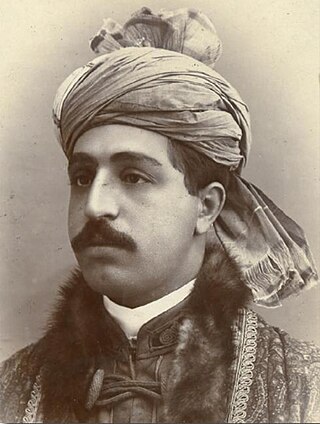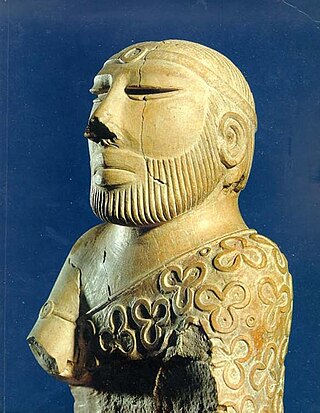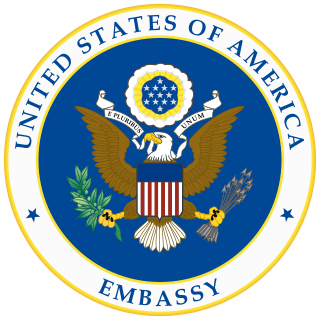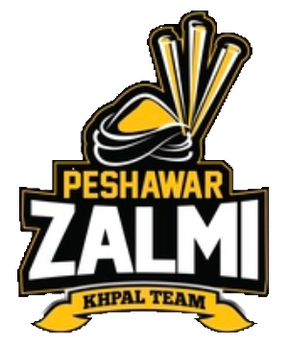
Transport in Pakistan is extensive and varied. In recent years, new national highways have been built, with the addition of motorways which have improved trade and logistics within the country. Pakistan's rail network is also undergoing expansion in recent years. Airports and seaports have been built with the addition of foreign and domestic funding. Transportation challenges in Pakistan are escalating due to poor planning, inadequate governance, and corrupt practices.

Peshawar is the sixth most populous city of Pakistan, with a district population of over 4.7 million in the 2023 census. It is the capital of the province of Khyber Pakhtunkhwa, where it is the largest city. It is situated in the north-west of the country, lying in the Valley of Peshawar. Peshawar is primarily populated by Pashtuns, who comprise the second-largest ethnic group in the country.

The Inter-Services Intelligence is the largest and best-known component of the Pakistani intelligence community. It is responsible for gathering, processing, and analyzing any information from around the world that is deemed relevant to Pakistan's national security. The ISI reports to its director-general and is primarily focused on providing intelligence to the Pakistani government.

Ghazi Mohammad Ayub Khan also known as The Victor of Maiwand or The Afghan Prince Charlie was, for a while, the governor of Herat Province in the Emirate of Afghanistan. He was Emir of Afghanistan from 12 October, 1879 to 31 May, 1880. He also led the Afghan troops during the Second Anglo-Afghan War and defeated the British Indian Army at the Battle of Maiwand. Following his defeat at the Battle of Kandahar, Ayub Khan was deposed and exiled to British India. However, Ayub Khan fled to Persia. After negotiations in 1888 with Sir Mortimer Durand, the ambassador at Tehran, Ayub Khan became a pensioner of the British Raj and traveled to British India in 1888, where he lived until his death in 1914 in Lahore, Punjab. He was buried in Peshawar and had eleven wives, fifteen sons, and ten daughters. Two of his grandsons, Sardar Hissam Mahmud el-Effendi and Sardar Muhammad Ismail Khan, served as brigadiers in the Pakistan Army.

Lieutenant General Hamid GulHI(M) SI(M) SBt was a Pakistani three-star general and defence analyst. Gul was notable for serving as the Director-General of the Inter-Services Intelligence (ISI), Pakistan's premier intelligence agency, between 1987 and 1989. During his tenure, Gul played an instrumental role in directing ISI support to Afghan resistance groups against Soviet forces in return for funds and weapons from the US, during the Soviet–Afghan War, in co-operation with the CIA.
On 13 January 2006 the Central Intelligence Agency fired missiles into the Pakistani village of Damadola in the Bajaur tribal area, near the Afghan border, killing at least 18 people. United States officials later admitted that no al-Qaeda leaders perished in the strike and that only local villagers were killed. The attack purportedly targeted Ayman al-Zawahiri, second-in-command of al-Qaeda after Osama bin Laden, who was thought to be in the village.

This is a timeline of Pakistani history, comprising important legal and territorial changes and political events in the region of modern-day Pakistan. To read about the background of these events, see History of Pakistan and History of the Islamic Republic of Pakistan.
Abdul Rahim Muslim Dost is an Afghan Salafi jihadist militant who served primarily with the Taliban, and later, as a founding member of ISIS–K. Dost's militancy began by age 19, when he left Afghanistan to join the Ikhwan, carrying out the Grand Mosque seizure in Mecca, Saudi Arabia before most of the group were captured and executed, though he escaped to Peshawar, Khyber Pakhtunkhwa, Pakistan. By 1986, he had returned to Afghanistan to fight in the Soviet–Afghan War as a member of Jamaat al-Dawah ila al-Quran wal-Sunnah, a Salafist forerunner to the Taliban. Following the Soviet withdrawal, he joined the Taliban as they ascended to power in the 1990s. During the US invasion of Afghanistan in 2001, Dost was arrested and held in the US detention camp at Guantanamo Bay, Cuba, where he was noted for his poetic writings. In April 2005, he was released following a Combatant Status Review Tribunal, and returned to Peshawar, but was quickly recaptured by the Pakistani ISI, before ultimately being released in a prisoner exchange between Pakistani government and the Pakistani Taliban (TTP) in 2008. From his release from Pakistani custody through 2014, he was active with the Taliban in the Afghanistan-Pakistan border region, until swearing allegiance to the Islamic State's Khorasan Province in 2014. In late 2015 he purportedly left ISIS–K and the life of militancy, publicly condemning the group's emir, Hafiz Saeed Khan, as "illiterate" for approving attacks on civilians, however he reportedly maintains his allegiance to the Islamic State and its leader Abu Bakr al-Baghdadi.
Sheikh Ahmed Salim Swedan was a fugitive wanted in the United States as a participant in the 1998 U.S. embassy bombings. He was alleged to have purchased the Toyota and Nissan trucks used in the attacks, flying out of Nairobi to Karachi, Pakistan five days before the assault was launched. Swedan was on the FBI Most Wanted Terrorists list since its inception in October 2001. He was born in Mombasa, Kenya.
Sectarian violence in Pakistan refers to violence directed against people and places in Pakistan motivated by antagonism toward the target's religious sect. As many as 4,000 Shia are estimated to have been killed in sectarian attacks in Pakistan between 1987 and 2007, and thousands more Shia have been killed by Salafi extremists from 2008 to 2014, according to Human Rights Watch (HRW). Sunni Sufis and Barelvis have also suffered from some sectarian violence, with attacks on religious shrines killing hundreds of worshippers, and some Deobandi leaders assassinated. Pakistan minority religious groups, including Hindus, Ahmadis, and Christians, have "faced unprecedented insecurity and persecution" in at least two recent years, according to Human Rights Watch. One significant aspect of the attacks in Pakistan is that militants often target their victims places of worship during prayers or religious services in order to maximize fatalities and to "emphasize the religious dimensions of their attack".
This is a list of activities ostensibly carried out by the U.S. Central Intelligence Agency (CIA) within Pakistan. It has been alleged by such authors as Ahmed Rashid that the CIA and ISI have been waging a clandestine war. The Afghan Taliban—with whom the United States was officially in conflict—was headquartered in Pakistan's Federally Administered Tribal Areas during the war and according to some reports is largely funded by the ISI. The Pakistani government denies this.

Afghanistan–Pakistan relations refer to the bilateral ties between Afghanistan and Pakistan. In August 1947, the partition of British India led to the emergence of Pakistan along Afghanistan's eastern frontier, and the two countries have since had a strained relationship; Afghanistan was the sole country to vote against Pakistan's admission into the United Nations following the latter's independence. Territorial disputes along the widely known "Durand Line" and conflicting claims prevented the normalization of bilateral ties between the countries throughout the mid-20th century. Various Afghan government officials and Afghan nationalists have made irredentist claims to large swathes of Pakistan's territory in modern-day Khyber Pakhtunkhwa and Pakistani Balochistan, which complete the traditional homeland of "Pashtunistan" for the Pashtun people. Afghan territorial claims over Pashtun-majority areas that are in Pakistan were coupled with discontent over the permanency of the Durand Line which has long been considered the international border by every nation other than Afghanistan, and for which Afghanistan demanded a renegotiation, with the aim of having it shifted eastward to the Indus River. During the Taliban insurgency, the Taliban has received substantial financial and logistical backing from Pakistan, which remains a significant source of support. Nonetheless, Pakistan's support for the Taliban is not without risks, as it involves playing a precarious and delicate game. Further Afghanistan–Pakistan tensions have arisen concerning a variety of issues, including the Afghan conflict and Afghan refugees in Pakistan, water-sharing rights, and a continuously warming relationship between Afghanistan and India, but most of all the Taliban government in Afghanistan providing sanctuary and safe havens to Pakistani Taliban terrorists to attack Pakistani territory. Border tensions between Afghanistan and Pakistan have escalated to an unprecedented degree following recent instances of violence along the border. The Durand Line witnesses frequent occurrences of suicide bombings, airstrikes, or street battles on an almost daily basis. The Taliban-led Afghan government has also accused Pakistan of undermining relations between Afghanistan and China and creating discord between the neighbouring countries.

The Pakistani Taliban, formally called the Tehreek-e-Taliban-e-Pakistan, is an umbrella organization of various Islamist armed militant groups operating along the Afghan–Pakistani border. Formed in 2007 by Baitullah Mehsud, its current leader is Noor Wali Mehsud, who has publicly pledged allegiance to the Afghan Taliban. The Pakistani Taliban share a common ideology with the Afghan Taliban and have assisted them in the 2001–2021 war, but the two groups have separate operation and command structures.
Americans in Pakistan form a sizeable expatriate community. According to Pakistan's Ministry of Interior, there were 52,486 Americans residing in Pakistan in 2015. Some of them are Pakistani Americans who have returned to Pakistan. Many Pakistani Americans returned during the unstable conditions post-September 11 attacks and the global financial crisis.

The Embassy of the United States in Islamabad is the diplomatic mission of the United States in Pakistan. The embassy in Islamabad is one of the largest U.S. embassies in the world, in terms of personnel, and houses a chancery and complex of office buildings. The embassy complex also houses a contingent of military officials and intelligence personnel in addition to diplomatic and non-diplomatic staff. U.S. Department of State also maintains Consulates in Karachi, Lahore and Peshawar.
The Embassy of Afghanistan in Islamabad is the diplomatic mission of the Islamic Emirate of Afghanistan to Pakistan.

Al-Qaeda in the Indian Subcontinent usually abbreviated as AQIS, is a branch of the Islamist militant organization Al-Qaeda which aims to fight the governments of Pakistan, Afghanistan, India, Myanmar and Bangladesh in order to establish an Islamic state and seeks to establish an Islamic caliphate in Indian Subcontinent.

On 16 December 2014, six gunmen affiliated with the Tehrik-i-Taliban Pakistan (TTP) conducted a terrorist attack on the Army Public School in the northwestern Pakistani city of Peshawar. The terrorists, all of whom were foreign nationals, comprising one Chechen, three Arabs and two Afghans, entered the school and opened fire on school staff and children, killing 149 people including 132 schoolchildren ranging between eight and eighteen years of age, making it the world's fifth deadliest school massacre. Pakistan launched a rescue operation undertaken by the Pakistan Army's Special Services Group (SSG) special forces, who killed all six terrorists and rescued 960 people. In the long term, Pakistan established the National Action Plan to crack down on terrorism.

Peshawar Zalmi is a Pakistani franchise Twenty20 cricket team which plays in the Pakistan Super League and represents Peshawar, the capital city of the Khyber Pakhtunkhwa province. The team is owned by Javed Afridi. Peshawar Zalmi was established in 2015 following the announcement of the inaugural Pakistan Super League (PSL) by the Pakistan Cricket Board (PCB). Babar Azam is the current captain and Daren Sammy is the current head coach of the team.















